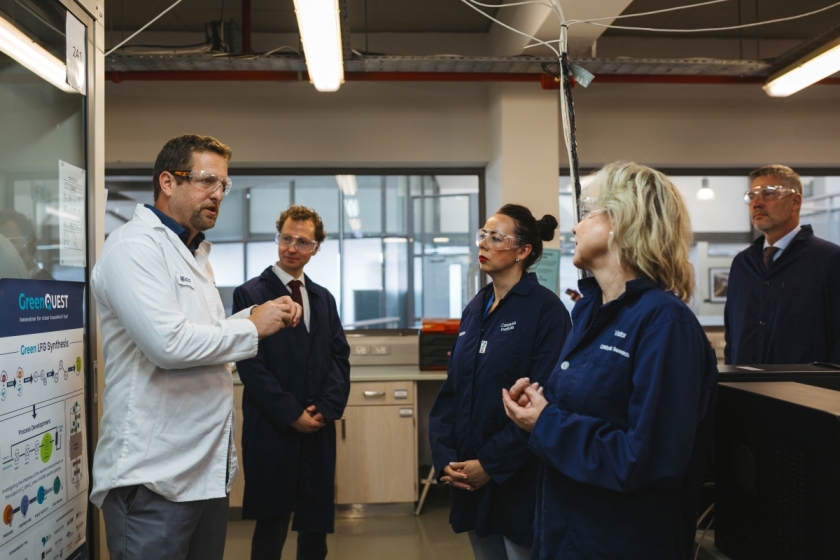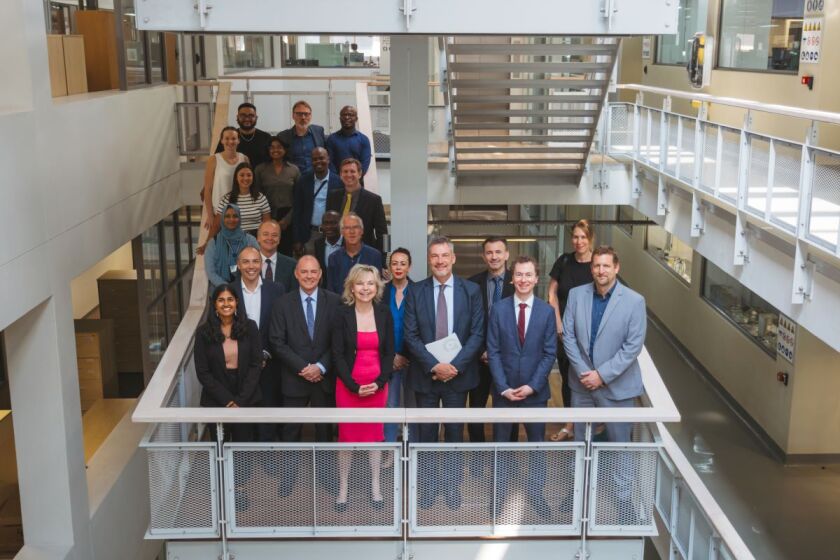Clean cooking fuel with a great impact for southern Africa

Sabine Döring (2nd from right), State Secretary at the Federal Ministry of Education and Research (BMBF), learned about the GreenQUEST initiative during her visit to the University of Cape Town. © UCT

More than 50 scientists from South Africa and Germany are working together in the interdisciplinary GreenQuest project. © UCT
Burning biomass for cooking causes harmful environmental and health issues. The German-South African GreenQUEST initiative is developing a clean household fuel. It aims to reduce climate-damaging CO2 emissions and to improve access to energy for households in sub-Saharan Africa.
In sub-Saharan Africa, almost one billion people have limited access to clean household energy. The widespread use of biomass (including firewood) as an energy source contributes to deforestation, soil erosion and carbon dioxide emissions.
The GreenQUEST project, funded by the German Federal Ministry of Education and Research (BMBF), aims to develop a green liquefied petroleum gas (LFG or gLFG) as an alternative to liquefied petroleum gas (LPG). The gLFG currently mirrors the efficiency and clean-burning qualities of LPG but without its fossil carbon burden. It is to be produced from green hydrogen, which is obtained using renewable energies, and carbon dioxide captured from the atmosphere.
The CO2-neutral fuel also promises better access to clean energy for low-income households in Africa. GreenQUEST is not only promoting the technical development of green LPG, but is also analysing the economic, environmental and social impact that a market launch of green LPG could have.
50 researchers from South Africa and Germany work hand in hand
More than 50 scientists from South Africa and Germany are working together on the interdisciplinary project. It is led by the Catalysis Institute of the University of Cape Town (UCT) and the Helmholtz Zentrum Berlin. This partnership promotes lasting relationships in the field of energy research and thus strengthens the strategic alliance between South Africa and Germany.
State Secretary of BMBF sees the potential for positive change globally
"The cooperative approach driving the GreenQUEST project has the potential to effect positive change not only in African communities but globally," said State Secretary in the Ministry of Education and Research (BMBF) Prof Dr Sabine Döring on the occasion of her visit to the University of Cape Town. "This exemplifies the commitment of Germany and South Africa to support sustainable initiatives, underscoring the importance of working together for the betterment of all."
red/sz
https://www.helmholtz-berlin.de/pubbin/news_seite?nid=26646;sprache=en
- Copy link
-
Battery research with the HZB X-ray microscope
New cathode materials are being developed to further increase the capacity of lithium batteries. Multilayer lithium-rich transition metal oxides (LRTMOs) offer particularly high energy density. However, their capacity decreases with each charging cycle due to structural and chemical changes. Using X-ray methods at BESSY II, teams from several Chinese research institutions have now investigated these changes for the first time with highest precision: at the unique X-ray microscope, they were able to observe morphological and structural developments on the nanometre scale and also clarify chemical changes.
-
Hydrogen: Breakthrough in alkaline membrane electrolysers
A team from the Technical University of Berlin, HZB, IMTEK (University of Freiburg) and Siemens Energy has developed a highly efficient alkaline membrane electrolyser that approaches the performance of established PEM electrolysers. What makes this achievement remarkable is the use of inexpensive nickel compounds for the anode catalyst, replacing costly and rare iridium. At BESSY II, the team was able to elucidate the catalytic processes in detail using operando measurements, and a theory team (USA, Singapore) provided a consistent molecular description. In Freiburg, prototype cells were built using a new coating process and tested in operation. The results have been published in the prestigious journal Nature Catalysis.
-
Rutger Schlatmann re-elected as ETIP PV Chair
The European Technology and Innovation Platform for Photovoltaics (ETIP PV) was created by the European Commission in order to promote photovoltaic technologies and industries in Europe. Now, the ETIP PV Steering Committee elected a new Chair, as well as two Vice-Chairs for the term 2024 – 2026. Rutger Schlatmann, head of the division Solar Energy at the HZB, and professor at HTW Berlin, was re-elected as the ETIP PV Chair.
